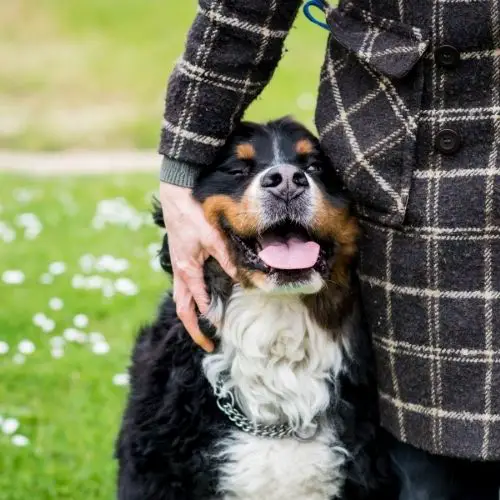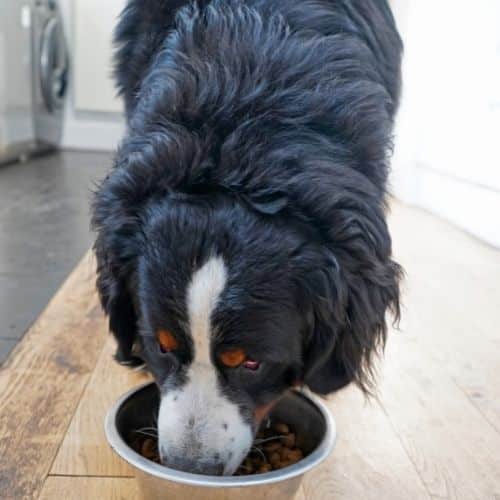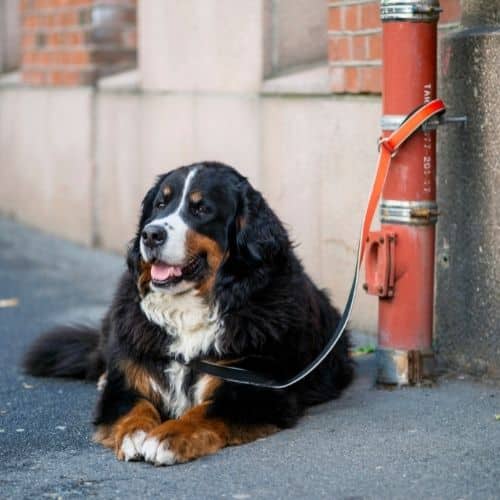The Bernese Mountain dog is on the shortlist of many pet lovers in our country. This dog breed is one of the favorite dogs of Americans and we can understand that. [1] BMD’s gorgeous coat is a treat for the eyes and its personality is pleasant and malleable. One of the questions that come up when researching this dog breed is: do Bernese Mountain dogs drool?
Drooling can be very annoying, especially if you live in an apartment.
By reading this article you will get to know this dog breed better. In the end, you will find out how much the Bernese Mountain dog drools and other pros and cons of the breed. Hopefully, you will be able to decide if this dog is a good choice for you and your family.
Do Bernese Mountain dogs drool?
Short answer to your question – yes, these dogs drool.
However, their drooling level is moderate for most individuals. Moreover, it can be handled using some simple techniques.
What causes drooling in dogs?

The first thing you need to know that a certain amount of drooling is normal in all dog breeds. Some dog breeds, such as the Mastiff and the Bloodhound, drool constantly, making this phenomenon a fact of life.[2]
There are multiple causes of drooling in dogs:
Head and lip conformation
For some dogs, the shape of their head and/or lips is the culprit. They simply cannot retain the amount of saliva they produce. The drool collects into the folds of the dog’s lips. From there it flows or it sprays into the air when the dog shakes its head.
Anticipating a delicious food
Any dog can drool a little when they are expecting a treat or their favorite food. Just like people, dogs experience a watering mouth when they anticipate something delicious. This cause and the previous one are natural and not the symptom of a health problem.
Mouth and throat problems
If the dog has a health problem that prevents it from swallowing its saliva, it will drool. Such health issues include fractured teeth, digestive tract tumors, irritated gums, and foreign bodies. Does your dog drool more than usually? Take it to the vet for a checkup; there could be something wrong with it.[3]
An upset stomach
Drooling can also be caused by stomach issues or nausea. Excessive drooling often happens when your dog has motion sickness and travels by car. The problem usually disappears when the motion is over.
Another possible cause is your dog having eaten something bad, such as a piece of toy or a poisonous plant. Toxic substances cause additional symptoms, like vomiting, shaking, and lethargy.
Other conditions
There can be other health conditions that have drooling as a symptom. These include: heat stroke, seizures, respiratory infections, neuromuscular conditions, kidney disease, liver disease, and rabies. Consult your veterinarian about any new or increased drooling.[4]
How to handle your dog’s excessive drooling

If your dog drools due to its particular anatomy there is not much you can do about it. Nevertheless, you can take some simple measures to manage the problem more effectively. [5] They are:
- Cleaning drool stains fast
If you let drool stains dry, they will become crusty. When you have a drooling dog such as Bernese Mountain dog, keep lots of towels around your house. This way, you will be able to clean the stains immediately.
- Tying a bib around the dog’s neck
You can tie a bib or a more fashionable bandana around your dog’s neck. This will absorb some of the saliva as it falls.
- Wiping the dog’s mouth
Remember to dry your dog’s mouth after it has exercised. Your canine companion tends to drool more after running or taking long walks.
- Laying a towel near the dog’s food bowl
Dogs tend to drool when they anticipate food, and you may see lots of stains near their food bowls. Lay a washable rug on the floor near the food bowl to prevent staining the floor.
- Not feeing the dog just before a car ride
Preparing to take your dog for a ride? Feed it at least three hours before leaving, as dogs can drool more in the car.
Consider feeding your dog less when it’s hot outside.
- Getting used to it
There is no way you can eliminate your furry friend’s drooling completely. And it might ruin your garments. When at home, wear clothes that are comfortable and easy to wash, and keep the “good” ones for going out.
The question is – are you willing to cope with the saliva deluge of a drooling dog breed? Are you a cleaning maniac? Then breeds such as Bernese Mountain dog and Bloodhound may not be the best choice for you.
Although many dog parents end up getting used to those wet, wet kisses…
Cleaning drool stains
Drool stains from your home should be cleaned not just for aesthetic reasons. Dog saliva may contain bacteria that can be harmful to people with a weak immune system.
Drool stains are notoriously unpleasant to remove, and the more they sit and dry, the harder to clean they become. Here are some ways to take care of drool stains efficiently:
- Use a blend of vinegar and water for walls, ceilings, and floors;
- Use rubbing alcohol for sofas and other furniture;
- Soak drool-stained clothes into a solution of water, dishwashing detergent, and ammonia. The stained garment should be allowed to sit for at least 15 minutes.
Addressing behavioral causes
Many times, the cause of drooling can be behavioral. A few things you can try include:
- Settling the dog before allowing guests to enter the house;
- Placing the dog in a quiet place when you have visitors;
- Keep a towel handy when you cook to wipe the dog’s mouth and potential stains.
About the Bernese Mountain dog breed

The Bernese Mountain dog is one of the most popular dog breeds out there, due to its beautiful tricolor coat and gentle expression. Nicknamed the Berner, this dog has qualities such as being loyal and loving and being good around children and pets.
Their energy levels are high but not in a way that exhausts the owner. BMD’s protective instinct is strong without the dog becoming aggressive.
The Bernese Mountain dog is calm and friendly, and can even become shy towards certain categories of people. If you adopt a puppy, make sure you provide him or her with lots of socialization. The purpose is to prevent the dog’s innate caution from evolving into timidity.
The Berner responds well to obedience training, but remember to always handle this dog kindly. If you own a male, expect some hardheadedness during his adolescence.
However, there are a few disadvantages too when it comes to living with a Bernese Mountain dog:
Relatively short lifespan
A Bernese Mountain dog has a life span of just 7 to 10 years. Common health issues are hip and elbow dysplasia, inherited cancers, heart disease, and epilepsy.
A slight tendency to bark
This dog breed has a medium tendency to bark. This behavior will manifest mostly if the dog is not exercised or stimulated enough.
Shedding
The Bernese Mountain dog sheds a lot, and his medium-length double coat requires lots of care and brushing.
Not doing well in warm climates
The Berner’s double coat is not well suited for warm climates; this Alpine dog prefers exercising in the cold. They are more like the pulling-sleds-and-romping-in-snow kind of dog.
Drooling
The Bernese Mountain dog is among the breeds that drool the most. This issue, as well as the shedding, may deter some pet lovers from choosing this dog as their companion.
Separation anxiety
Don’t leave your dog alone too long as the separation anxiety will result in destructive behaviors and barking.
A short history of the Bernese Mountain dog
This beautiful dog breed has originated in Switzerland, around the city of Berne, with ancestors descending from Roman mastiffs. There are four varieties of Swiss mountain dogs, with the Berner being one of them. What sets this breed apart from the other three is its longer and silkier coat.
In the 19th century, the Bernese Mountain dog has been used to guard farms, pull heavy loads, and drive livestock. They were replaced at work by machines, but their popularity revived in the U.S. in the early 1900s. The Berner is currently one of the most popular dogs breeds in North America.
Read Also: Home Remedies To Stop Dog Shedding
Bottom Line
So, do Bernese Mountain dogs drool? They generally do, in different amounts.
A small survey revealed that almost half of Berner owners said their canine friend drooled in moderate amounts. Just 17.6% revealed that their dog drooled all the time, while around a quarter said that only after eating or drinking. A small number of three owners, surprisingly, said their dog never drooled.
In conclusion, the Bernese Mountain dog may not be the breed with the most accentuated drooling. But if you choose this dog as your companion, be prepared for some slobber.
